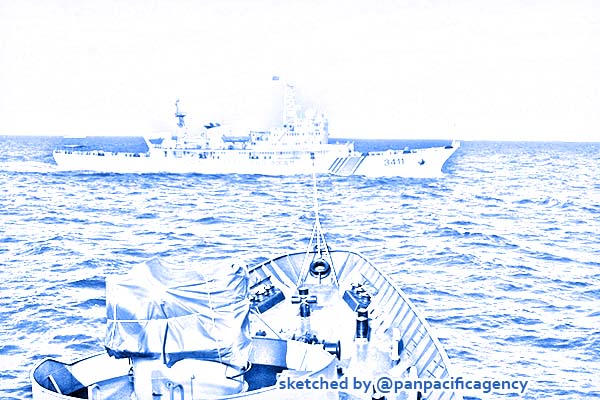[Analytics] South China Sea likely to be high on ASEAN agenda

Tensions have been growing between China and Vietnam in the South China Sea. Photo: Reuters. Sketched by the Pan Pacific Agency.
Next year’s leading role in regional body may see Hanoi push for unified approach from member countries. Vietnamese deputy foreign minister signals legal action could be on the table to resolve contested claims with Beijing. Laura Zhou specially for the South China Morning Post.
Territorial disputes over the resource-rich South China Sea are expected to feature prominently in engagements between China and Asean next year as Vietnam prepares to take over as chairman of the regional body.
In a sign of its toughening stance on the sensitive issue, Vietnamese deputy foreign minister Le Hoai Trung said his country was considering legal action against China to resolve the contested claims in the South China Sea, although diplomatic measures were still the preferred option.
Speaking at a South China Sea conference in Hanoi on Wednesday, Trung said the UN Convention on the Law of the Sea provided sufficient mechanisms for Vietnam to apply litigation in defence of its claimed maritime territorial rights.
Trung’s remarks raised the prospect that Hanoi may follow the path taken by Manila in 2013 and pursue China through an international court of arbitration in The Hague over the recent stand-off near the energy-rich Vanguard Bank, which is claimed by the two Communist neighbours.
In Beijing, Chinese foreign ministry spokesman Geng Shuang called on Vietnam – currently the most vocal critic of Chinese claims in the strategic waterway, which is also one of the world’s busiest – not to “complicate” the South China Sea issue.
Regional observers said the rotating chairmanship of Asean (the Association of Southeast Asian Nations) was important in setting the official agenda for the bloc in the year ahead.
“The South China Sea issue is likely to be high on Vietnam’s agenda and that means the agenda for Asean next year may not be as friendly to China as it has been in the past two years when it comes to South China Sea issues,” said Kang Lin, director of the Hainan Institute for Regional Development and Governance in China’s southernmost island province.
Hoang Thi Ha, a researcher at the ISEAS-Yusof Ishak Institute’s Asean Studies Centre in Singapore, said Vietnam would be looking for greater unity among the Asean members over the South China Sea issue.
“The recent episode [in Vanguard Bank] is just the prelude to a long, fraught future ahead for Vietnam in dealing with its northern neighbour: Vietnam’s rights to maritime resources in its own exclusive economic zone will increasingly be constrained and obstructed by Chinese actions,” he said.
“Hanoi will tread very carefully and tactfully, bearing in mind the need to forge, not to unravel, Asean’s tenuous unity on this matter and it will seek to foster Asean consensus by framing the South China Sea issue under broader regional interests – respect for international law, peace and stability, maritime security, and protection of marine resources and environment.”
Vietnam, Malaysia, the Philippines and Brunei – all Asean members – have competing claims in the waterway that overlap with China’s, making it one of the most contentious – and perhaps most dangerous – challenges in the region. But clashes over the disputed waters have been wider and more bitter with Vietnam, Kang said.
In 2014 a state-owned Chinese oil rig was towed into waters near Da Nang on Vietnam’s south central coast, provoking a stand-off at sea and the worst diplomatic crisis between the two countries in decades which also led to deadly anti-Chinese rioting across Vietnam.
“China would not feel comfortable if Vietnam played the South China Sea card in Asean’s agenda setting next year,” Kang said.
Tensions between Beijing and Hanoi flared again this summer when a Chinese survey vessel, the Haiyang Dizhi 8 began making passes through an oil block operated by Russian energy company Rosneft, Hanoi’s exploration partner. The resulting stand-off between the two neighbours’ coastguard vessels eased when Chinese ships left the area earlier last month.
Vietnam accused China of territorial violations, while Beijing said the Haiyang Dizhi’s seismic survey mission was “legitimate and reasonable” and that any foreign-owned oil operations in the disputed waters violated China’s interests.
While observers said the withdrawal of the Haiyang Dizhi could “temporarily” ease tensions, oil and gas explorations as well as possible conflicts between fishing boats and coastguard vessels of the rival claimants remained the most contentious issues between the two countries.
During a meeting in Thailand last Sunday, Chinese Premier Li Keqiang told the leaders of the 10 Asean member states that Beijing “stands ready to work with Asean countries” for new progress in the South China Sea code of conduct which, once enacted, is expected to manage the disputes and prevent conflict in the waters.
Beijing and Asean have pledged to finalise the document – now in its second reading – by 2022 despite lingering concerns over whether Beijing would agree to a legal and binding status of the document which could effectively limit its room for manoeuvre in waters where it is now fast consolidating control.
Kang said Beijing was likely to push for quick progress on the negotiations over a code of conduct while seeking to improve relations with other claimants like the Philippines.
In a move underpinning such efforts, Beijing and Manila announced late last month that an inter-governmental committee had been established to oversee the coordination of oil and gas exploration in the disputed South China Sea waters.
“If cooperation with the other claimants goes well, China would tolerate Vietnam trying to make use of its chairmanship to press it over the South China Sea issue, because the negative impact would be limited and this is a cost that China could pay,” Kang said.